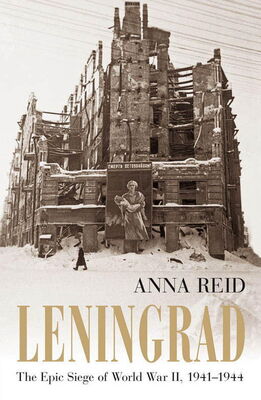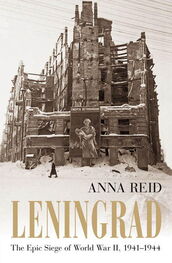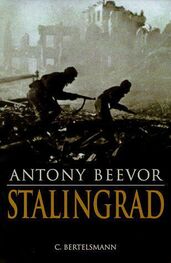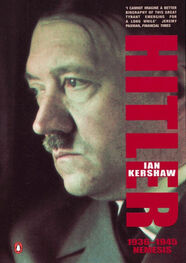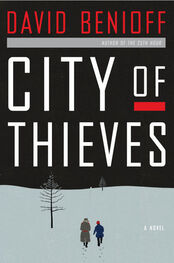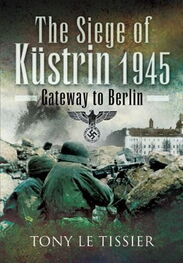Burdick and Jacobsen, eds, Franz Halder, The Halder War Diary , p. 608 (2 March 1942).
Hockenjos, typescript, Bundesarchiv/Militärarchiv: p. 84 (13 and 16 April 1942).
Glantz, The Battle for Leningrad 1941–44 , pp. 202–3.
I. I. Kalabin, in I. A. Ivanova, ed., Tragediya Myasnogo Bora: sbornik vospominanii uchastnikov i ochevidtsev Lyubanskoi operatsii , pp. 139–40. For similar accounts see Glantz, The Battle for Leningrad 1941–44 , p. 204.
In a letter to Zhdanov of 3 June 1942 Khozin defended himself against accusations of drunkenness and misbehaviour with two telegraph girls. The telegraph operators, he protested, joined him only to watch films, and though he took ‘100g of vodka before supper, sometimes even two or three little glasses’, he had never been drunk in his life. (RGASPI: Fond 77, op. 3, delo 133.)
I. I. Kalabin, in Ivanovna, ed., Tragediya Myasnogo Bora , p. 142.
I. D. Nikonov, in ibid., p. 157.
For a full account of Vlasov’s career see Catherine Andreyev, ‘Andrei Andreyevich Vlasov’, in Harold Shukman, ed., Stalin’s Generals , pp. 301—11.
RGASPI: Fond 83, op. 1, yed. khr. 18, pp. 91–104.
Glantz, The Battle for Leningrad 1941–44 , pp. 207–8.
Ilya Frenklah, www.iremember.ru
Alexander Werth, Russia at War , p. 399.
Andrew Roberts, Masters and Commanders: How Roosevelt, Churchill, Marshall and Alanbrooke Won the War in the West , pp. 271, 287.
Ales Adamovich and Daniil Granin, A Book of the Blockade , pp. 63–4; Geraldine Norman, The Hermitage: The Biography of a Great Museum , pp. 257–8.
Adamovich and Granin, A Book of the Blockade , p. 89; Vera Inber, Leningrad Diary , p. 200 (25 May 1944). Fifty-two people died from eating poisonous wild plants (Andrei Dzeniskevich, ed., Leningrad v osade: sbornik dokumentov , doc. 147, p. 312).
Dmitri Likhachev, Reflections on the Russian Soul: A Memoir , p. 255.
Vasili Chekrizov, ‘Dnevnik blokadnogo vremeni’, Trudy Gosudarstvennogo Muzeya Istorii Sankt-Peterburga , vol. 8, p. 79 (19 May 1942).
Lidiya Ginzburg, Blockade Diary , p. 75. Notes to Pages 333–343
Olga Berggolts, ‘Iz dnevnikov’, Zvezda , 6, p. 154 (3 April 1942).
Lisa A. Kirschenbaum, The Legacy of the Siege of Leningrad, 1941–1995: Myth, Memories, and Monuments , p. 52. See also William Moskoff, The Bread of Affliction: The Food Supply in the USSR during World War II , pp. 203–4.
On 7 January 1942 Vera Inber attended a lecture titled ‘The Illness of Starvation’.
Lev Markhasev, ‘Dva Leningradskikh radio’, in G. S. Melnik and G. V. Zhirkov, eds, Radio, blokada, Leningrad , St Petersburg, 2005, p. 96; Catherine Merridale, Ivan’s War: The Red Army 1939–45 , p. 165.
Berggolts, Zvezda , 6, p. 163 (31 May 1942).
Nikita Lomagin, Neizvestnaya blokada , vol. 1, pp. 227–8. Markhasev, ‘Dva Leningradskikh Radio’, p. 97.
Aileen Rambov, ‘The Siege of Leningrad: Wartime Literature and Ideological Change’, in Robert Thurston and Bernd Bonwetsch, eds, The People’s War: Responses to World War II in the Soviet Union , pp. 163–4.
Berggolts, Zvezda , 6, pp. 160, 164 (13 May and 3 June 1942).
Elliott Mossman, ed., The Correspondence of Boris Pasternak and Olga Freidenberg, 1910–1954 , pp. 216–21.
Anna Zelenova, Stati, vospominaniya, pisma: Pavlovsky dvorets, istoriya i sudba , p. 115.
Roberta Reeder, Anna Akhmatova: Poet and Prophet , p. 269.
Vera Inber, Leningrad Diary , pp. 60–61, 70–71 (19 and 20 February, 10 and 12 March 1942).
20 Vasili Churkin, Voyennaya literatura: dnevniki i pisma, http://militera.lib.ru/db/churkinpart 2, pp. 9–10 (27 May and 28 June 1942).
Reeder, Anna Akhmatova , p. 277.
Vladimir Garshin, ‘Tam gde smert pomogayet zhizni’, Arkhiv Patologii , vol. 46, no. 5, 1984, pp. 83—8. (This short memoir was originally written in 1944.)
OSBP and Burial Trust reports of 14 April 1942 and 5 April 1943, in Dzeniskevich, ed., Leningrad v osade , docs 141 and 153, pp. 299, 337–8.
Reports to Zhdanov from Antyufeyev, head of the ‘instructors’ department of the City Party Committee, of 17 January, 28 March and 1 April 1942. TsGAIPD SPb: Fond 24, op. 2v, delo 5760.
Inber, Leningrad Diary , pp. 73–4 (28 March 1942).
Olga Grechina, ‘Spasayus spasaya chast 1: pogibelnaya zima (1941–1942 gg.)’, Neva , 1, 1994, p. 269.
Aleksandr Boldyrev, Osadnaya zapis: blokadniy dnevnik , pp. 76–9, 84 (26–31 March and 4 April 1942). Notes to Pages 344–352
Norman, The Hermitage , p. 256.
Letter to Zhdanov from Lieut Gen. Kabanov, 11 May 1942, in Dzeniskevich, ed., Leningrad v osade , doc. 144, p. 307. See also the city health department’s report to Kosygin and Popkov, of 31 March 1942, ibid., doc. 139, p. 296.
RGASPI: Fond 17, op. 43, delo 1150; protocol 57, p. 54; Dmitri Lazarev, ‘Vospominaniya o blokade’, Trudy Gosudarstvennogo Muzeya Istorii Sankt-Peterburga , vol. 5, pp. 211–12.
William Moskoff, The Bread of Affliction: The Food Supply in the USSR during World War II , p. 202; Richard Bidlack, Workers at War: Factory Workers and Labor Policy in the Siege of Leningrad , Carl Beck Papers, 902, p. 28.
RGASPI: Fond 17, op. 43, delo 1138; protocol 45, pp. 13, 44; protocol 47, p. 162. RGASPI: Fond 17, op. 43, delo 1139; protocol 48, p. 32. RGASPI: Fond 17, op. 43, delo 1140; protocol 50, pp. 1, 3, 90.
NKVD report to the Leningrad oblast Party Committee, Borovichi, 19 December 1942. TsGAIPD SPb: Fond 24, op. 20, delo 52.
NKVD reports of 5 August, 5 September and 6 October 1942, Nikita Lomagin, Neizvestnaya blokada , vol. 2, docs 78, 79, 80, pp. 328–39.
Vasili Chekrizov, ‘Dnevnik blokadnogo vremeni’, Trudy Gosudarstvennogo Muzeya Istorii Sankt-Peterburga , vol. 8, pp. 87, 97–8, 102 (29 June, 26 August and 21 September 1942).
Inber, Leningrad Diary , pp. 110–11 (16 September 1942).
Читать дальше